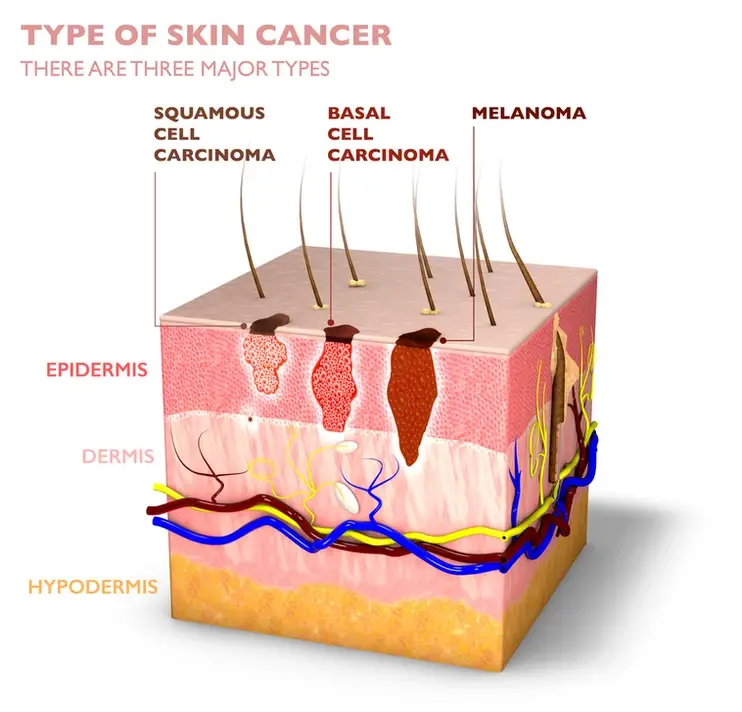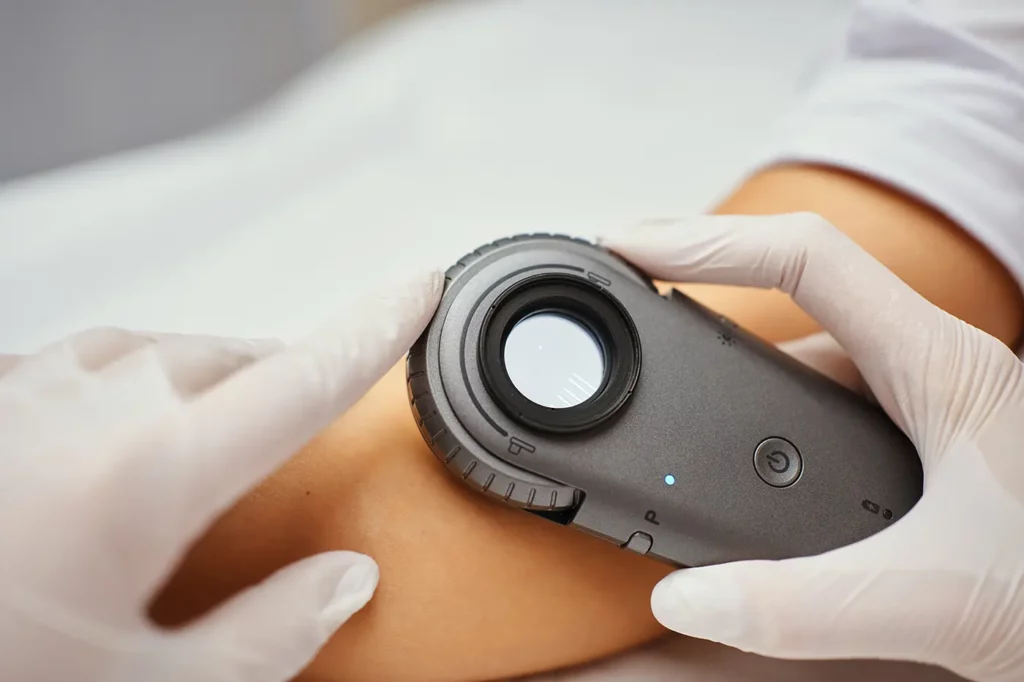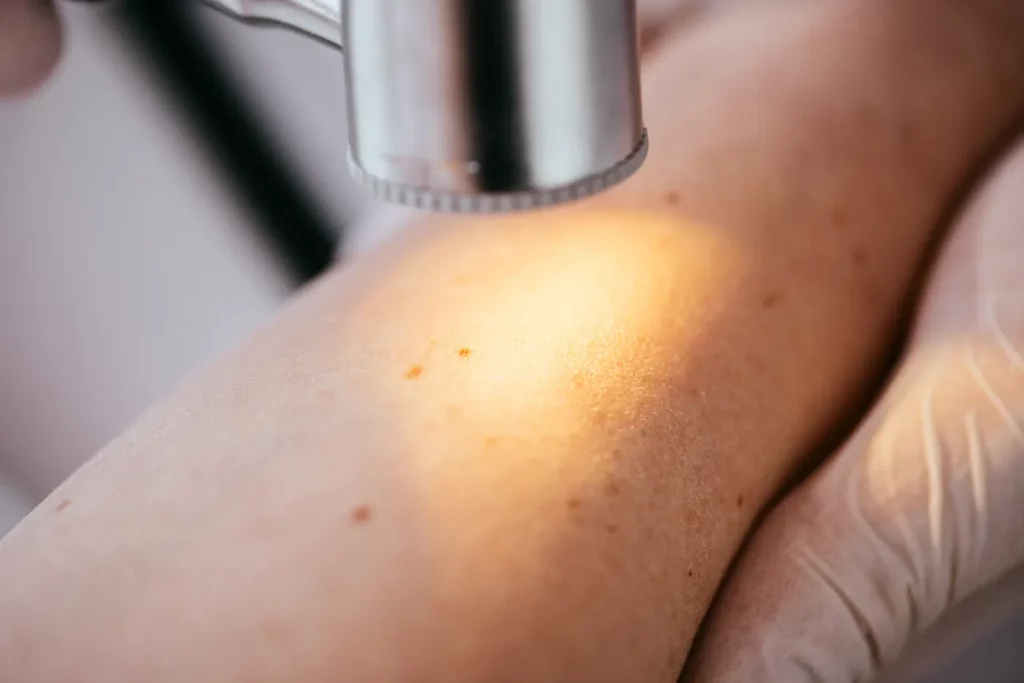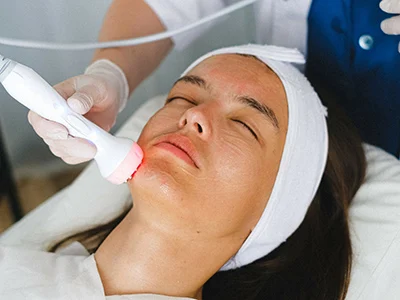At its core, skin cancer is the result of an uncontrolled proliferation of abnormal cells within the skin’s layers. The sun’s ultraviolet (UV) radiation is a significant factor, though not the sole contributor, in the development of this disease. UV radiation can cause DNA damage in skin cells, leading them down a path of unchecked growth and mutation. Beyond UV exposure, genetic predispositions and environmental influences also play a role, making skin cancer a complex condition.
The skin, our body’s largest organ, serves as a dynamic barrier protecting us from external harms. When its cells are damaged, whether by UV light or other means, they can begin to grow uncontrollably, forming tumors that may be benign or malignant. Malignant tumors are identified as skin cancer and require prompt medical attention.
Recognizing the early signs of skin cancer is crucial. Changes in the skin, particularly in the appearance or texture of moles or spots, can be early warnings. Regular self-examinations and professional skin checks are essential tools in early detection, providing a chance to address the disease before it progresses.
An Overview of Basal Cell Carcinoma (BCC)
Basal Cell Carcinoma (BCC) is the most frequently diagnosed form of skin cancer. It typically appears in sun-exposed areas such as the face, neck, and back of the hands. BCC often presents as a pearly bump, a flat, flesh-colored lesion, or a scar-like patch that does not heal. While BCC tends to grow slowly and is less likely to spread to other parts of the body, it can cause significant damage to surrounding tissues if not treated promptly.
Individuals with fair skin, a history of sun exposure, or frequent sunbathing are particularly at risk. Regular skin checks play a pivotal role in the early detection of BCC. Dermatological treatments, including Mohs surgery, topical treatments, and radiation therapy, can effectively address BCC and preserve the quality of life for those affected.
Squamous Cell Carcinoma (SCC) Explained
Squamous Cell Carcinoma (SCC) is a common type of skin cancer that can spread beyond its original site. SCC develops in the squamous cells of the skin and often appears as scaly, crusted, or ulcerated lesions in sun-exposed areas like the ear, face, neck, and hands. SCC is more aggressive than BCC and requires timely and decisive treatment.
Risk factors for SCC include extensive sun exposure, a history of sunburns, a compromised immune system, and certain pre-existing skin conditions. Preventative measures such as using broad-spectrum sunscreen, wearing protective clothing, and avoiding peak sun hours are essential.
Treatment for SCC may include surgical excision, cryotherapy, photodynamic therapy, and laser treatments, aiming to eliminate cancerous cells while preserving healthy skin.
The Threat of Melanoma
Melanoma is a more serious form of skin cancer due to its potential to spread to other organs. It originates in the pigment-producing melanocytes and can appear as benign moles or dark spots. Recognizing changes in size, color, or feel of moles is crucial for early detection. The ABCDE rule—Asymmetry, Border irregularity, Color variation, Diameter greater than 6mm, and Evolving—guides individuals in identifying potential concerns for timely medical evaluation.
Preventative measures against UV radiation, such as using sunscreen, wearing protective clothing, and seeking shade, are essential in reducing the risk of melanoma. Dermatologists play a crucial role in the early detection and management of melanoma, employing diagnostic tools and treatments to address the cancer effectively.
Rarer Types of Skin Cancer Worth Knowing
Beyond the common types of skin cancer, there are rarer forms such as Merkel Cell Carcinoma, Cutaneous T-cell Lymphoma, and Dermatofibrosarcoma Protuberans. Merkel Cell Carcinoma is aggressive and tends to recur, necessitating early detection and robust treatment strategies. Cutaneous T-cell Lymphoma, a type of lymphoma presenting in the skin, requires specialized therapy. Dermatofibrosarcoma Protuberans, though less aggressive, emphasizes the importance of surgical precision.
Managing these rare skin cancers involves a deep understanding of their behavior and a compassionate approach, as patients navigate the uncertainties these diagnoses bring.
Risk Factors for Developing Skin Cancer
Sun exposure is a leading risk factor for skin cancer, with UV radiation causing cellular damage. Fair skin offers less natural defense against UV rays, increasing the risk. Genetic factors, such as a family history of skin cancer, also play a role. A compromised immune system can make the body less capable of fighting cancerous cells.
Understanding these risk factors empowers individuals to make informed health choices and adopt vigilant skin care practices.
Preventative Measures to Protect Against Skin Cancer
Preventative measures against skin cancer include using sunscreen with an SPF of 30 or higher, wearing protective clothing, and seeking shade during peak sun hours. Regular skin examinations, both self-conducted and professional, are crucial for early detection. Avoiding tanning beds is also important to reduce the risk of skin cancer.
Navigating the Diagnosis Process
The path to a skin cancer diagnosis involves a thorough skin examination by a dermatologist, followed by a biopsy if a suspicious lesion is found. Imaging tests like MRI and CT scans may be used to assess the extent of the cancer. This process, while potentially daunting, ensures that the journey from suspicion to diagnosis is navigated with care and expertise.
Current Treatment Options for Skin Cancer
Treatment for skin cancer includes surgery, radiation therapy, chemotherapy, immunotherapy, and targeted therapy. Each option aims to eliminate cancer cells while minimizing the impact on the patient’s life. The treatment plan is tailored to the individual’s condition, ensuring the best possible outcome.
The Role of Professional and Compassionate Care Providers
Care providers, including dermatologists, oncologists, and support staff, play a vital role in guiding patients through the diagnosis and treatment of skin cancer. Their approach combines clinical expertise with compassion, ensuring that patients receive personalized care and support throughout their journey.
The Impact of Skin Cancer on Quality of Life
Skin cancer affects more than just physical health; it can significantly impact daily life and emotional well-being. Adjustments in daily routines, emotional challenges, and physical discomfort are part of the journey. Support systems and resilience play a crucial role in navigating these challenges.
Emerging Research and Future Directions in Skin Cancer Treatment
Emerging research in skin cancer treatment includes advancements in precision medicine, immunotherapy, and genetic editing technologies like CRISPR. Wearable technology and artificial intelligence are also being explored for early detection and monitoring. These developments promise a future with more effective treatments and better patient outcomes.




